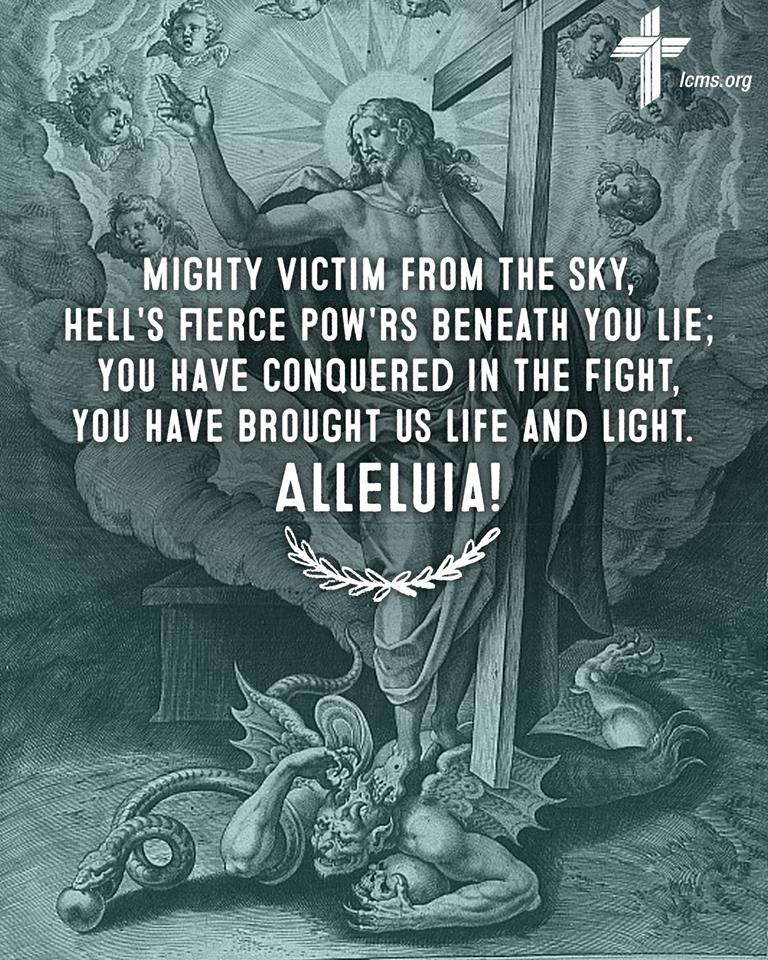 Grace, mercy, and peace to you from God our Father, and from our Lord and Savior, Jesus Christ, amen. The text for the sermon is the Gospel, which was read earlier.
Grace, mercy, and peace to you from God our Father, and from our Lord and Savior, Jesus Christ, amen. The text for the sermon is the Gospel, which was read earlier.
God’s Word says that there are two paths in life: the way of life and the way of death. The way of life is traveled only by faith in one individual, Jesus Christ, our Savior. To believe in any other God that the one triune God, to trust in any other Savior than the only Son of God, Jesus Christ, is to travel the wrong way in life. So today we hear Jesus’ words: “I am the way, and the truth, and the life. No one comes to the Father except through me.” Jesus is very clear and explicit in His words: He is the one and only way to the Father.
If Jesus is truly the only way to the Father, what does that mean? It means that Jesus’ way to the Father is the way of God’s will, that is, the way of grace, not the way of our human will, the way of works. There is a huge difference between the two ways once we look at what each way gets us.
Our sinful nature wants to get us to the Father our way, not God’s way. Our will is to think that we can earn our way to God because we’re “pretty good.” But when you are “pretty good,” it means that you’re not what God desires and that is perfect. That is what Jesus says to do: “You therefore must be perfect, as your heavenly Father is perfect.” But being perfect isn’t possible for us, so we will settle for “pretty good.” We use our merits as some sort of bargaining chip with God to gain our entry into heaven. But there is one point we fail to take into consideration – there is no bargaining with God.
To understand the one, singular way of salvation, we need to understand God the Father’s will. The will of God the Father is that all be saved and come to the knowledge of the truth. Jesus came to do the Father’s will, not His own. The Father’s will is the way of salvation by grace through faith in Christ – the only way of redemption.
For you and I, there is indeed hope. Our hope lies not in this world, but it lies in our Lord and Savior, Jesus Christ, and what He has done for us. Jesus tells the disciples, “In my Father’s house are many rooms. If it were not so, would I have told you that I go to prepare a place for you? And if I go and prepare a place for you, I will come again and will take you to myself, that where I am you may be also.”
Our hope lies in the promises that God has made to us through His Son Jesus Christ. Instead of reasons for despair, the disciples realize the good news that the cross of Jesus Christ overcomes troubled hearts with the promises, assurances, and benefits of our great God.
There is no need for troubled hearts, as they are overcome by the Lord’s amazing promise of what God has in store for us. We look at this world and we see how much it has suffered because of sin. We have wars. We have disease. We have death. We all have seen the effects of sin on this world and we ask ourselves, “Is this it? Is there more to this thing called life?” There is more to this thing called life, or at least life as we know it. There is salvation. There is forgiveness. There is everlasting life. No matter how good or how bad your life may be on this earth, there is more waiting for you. There is a room in heaven that your Savior has prepared for you. If that isn’t good enough, Jesus also tells us, “And if I go and prepare a place for you, I will come again and will take you to myself, that where I am you may be also.” Jesus will personally take us to our eternal rooms, rooms prepared by Jesus when He said from the cross, “It is finished” because there at the cross, Jesus paid for your sin, giving to you that key to your room in heaven.
Then Jesus speaks the all-familiar words to Thomas and the other disciples. “I am the way, and the truth, and the life. No one comes to the Father except through me.” If you want words of assurance and comfort, then these are the words for you. Jesus comforts the disciples with what they had previously learned and experienced. With these words, He reminds us that He is the world’s one Lord and Savior.
These words, Jesus also speaks to you. He spoke these words to you on the cross. He spoke these words to you at your baptism. He speaks these words to you this morning. He speaks these words when you feast upon His body and blood. He speaks these words to you each and every day of your life, and He will speak these words to you as you draw your final breath.
Christ is the one and only source of blessed existence and life for us. In our sin is death, the separation from God. Left to ourselves, we should remain in this separation forever, dead beyond hope. In the person of Jesus, God sent us “the life.” Take away Jesus, and the way, truth, and the life are gone. All hope of God and heaven outside of Jesus is vanity and worse. “Except through me” is absolute and final. Despair would be the order of the day for this world, except for this wonderful news that our Lord declares. Despite the sin and evil of the world, there is a Way. The way is not what we would expect. The way is not a route or a set of directions. Instead, it is a person – Jesus Himself. We cannot travel this route. Instead Jesus must take us. In fact, that is exactly what He promised when He said, “I will come again and will take you to myself, that where I am you may be also.”
This sentiment of Jesus, this truth of His Easter victory, is brought to light in the words of the hymn sung earlier: Mighty Victim from the sky, Hell’s fierce powr’s beneath You lie; You have conquered in the fight, You have brought us life and light. Alleluia! Now no more can death appall, Now no more the grave enthrall; You have opened paradise, And Your saints in You shall rise. Alleluia! The hymnist writes in the only way he knows how, the only way that is true. It has nothing to do with our posturing to God. It has nothing to do with whatever accomplishments we can show off to God. Our salvation, our victory over sin and death, has been accomplished for us by Jesus Christ, the Lamb of God that takes away the sin of the world.
Through the blood that flowed from His body on the cross, Jesus is the way. Through the Scriptures which testify He is the Lamb of God that takes away the sins of the world, Jesus is the truth. Through His taking our sin and our curse upon Himself, Jesus is the life. What comfort this is to our troubled hearts! In the name of Jesus, amen. Now the peace of God which passes all understanding, keep your hearts and minds through faith in Christ Jesus, amen.
 Grace, mercy, and peace to you from God our Father, and from our Lord and Savior, Jesus Christ, amen. The text for the sermon is the Gospel, which was read earlier.
Grace, mercy, and peace to you from God our Father, and from our Lord and Savior, Jesus Christ, amen. The text for the sermon is the Gospel, which was read earlier.